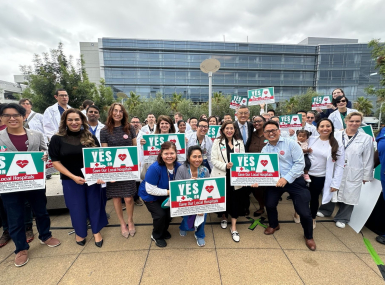ACA: Step in right direction for healthier counties
Author

Hon. Helen L. Holton
Upcoming Events
Related News
Dear Editor:
In the face of a new administration, there may be many things to take issue with regardless of what side of the aisle you reside on. For the National Organization of Black County Officials (NOBCO), a major concern is what will happen to health care and access to health care. Healthy citizens in healthy counties are a conversation worthy of discussion.
In partnership with the Centers for Disease Control and Prevention, NOBCO is working to address HIV/AIDS and has made strides in increasing awareness through outreach and education largely as a result of increased access to health care for more citizens. This infectious disease without a cure does not discriminate but comes with high levels of stigma and rejection.
The Affordable Care Act (ACA) opened the door for many without health care to take new interest in personal health and wellbeing. ACA is a step in the right direction towards healthier counties. Infectious diseases like HIV/AIDS take a greater toll on our communities than we may choose to acknowledge. They impact other quality-of-life areas such as housing, employment and overall county fiscal stability
Our hope is to see heath care and access to care be improved and expanded beyond its current capacity. NACo’s Health Steering Committee and Healthy Counties Advisory Board continue to address — from a policy perspective — the desires of counties across America towards healthier counties. NOBCO is committed in our pursuit of improving health and health disparities that impact some of the most vulnerable populations that our members represent: African Americans, LGBTs and other minorities.
Commissioner Joan Garner of Fulton County, Ga., chair of NACo’s Health Steering Committee and NOBCO board member, is a strong advocate and proponent of the work being done to bring awareness and increased outreach about HIV to the broader community. Commissioner Garner shared, “Our rate of HIV in Fulton County is complex, and is also driven by a range of socioeconomic factors and social determinants of health. For example, the population of people in Fulton County who are homeless or have housing instability overlaps our population with HIV. In the homeless community, in particular, we have seen an overlap of persons with co-occurring HIV and tuberculosis, which has created a ripple effect of public health resource needs.
“Unfortunately, the rates of HIV are also driven by other kinds of inequities in our culture that persist, even today. In the black community, many gay men are still battling stigma. Unfortunately, stigma can perpetuate riskier behaviors that are linked to higher rates of HIV infection. One way to prevent new infections is to address that stigma head on. We should work harder to address the social injustices and discriminatory practices that drive those who may be black, gay and HIV positive out of our health care systems. I believe that effective outreach starts with meeting people where they are. Let’s get involved in our communities, make our efforts visible, and take advantage of every opportunity to make a difference.”
Feb. 7 was National Black HIV/AIDS Awareness Day. NOBCO participated in various events from radio interviews to Twitter chats to Thunderclaps to bring awareness to the issue. We participate in all the HIV/AIDS Awareness Days throughout the year; this is a disease that cuts into all communities.
Our commitment is to share progress and the need to continue working to end the spread of this infectious disease without a cure today. Although the rates of infection are still uncomfortably high, progress to stem the tide is being made.
Many wonder about the changes the administration will establish for health and health care as it pertains to HIV over the next four years. We all are waiting with baited breath.
Sincerely,
Dr. Helen Holton
executive director
National Organization of Black County Officials
a NACo-affiliated association
Attachments
Related News

CMS issues new guidance on Medicaid Community Engagement Requirements
On December 8, the Centers for Medicare & Medicaid Services (CMS) released a Medicaid and CHIP Services Informational Bulletin (CIB) directing states on how to implement the Medicaid community engagement requirements enacted under Section 71119 of the One Big Beautiful Bill Act legislation (Public Law 119-21), or H.R. 1.

California county sales tax measure backfills federal healthcare cuts
Santa Clara County, Calif. will raise an estimated $330 million each year from a sales tax to backfill lose Medicaid funding.
